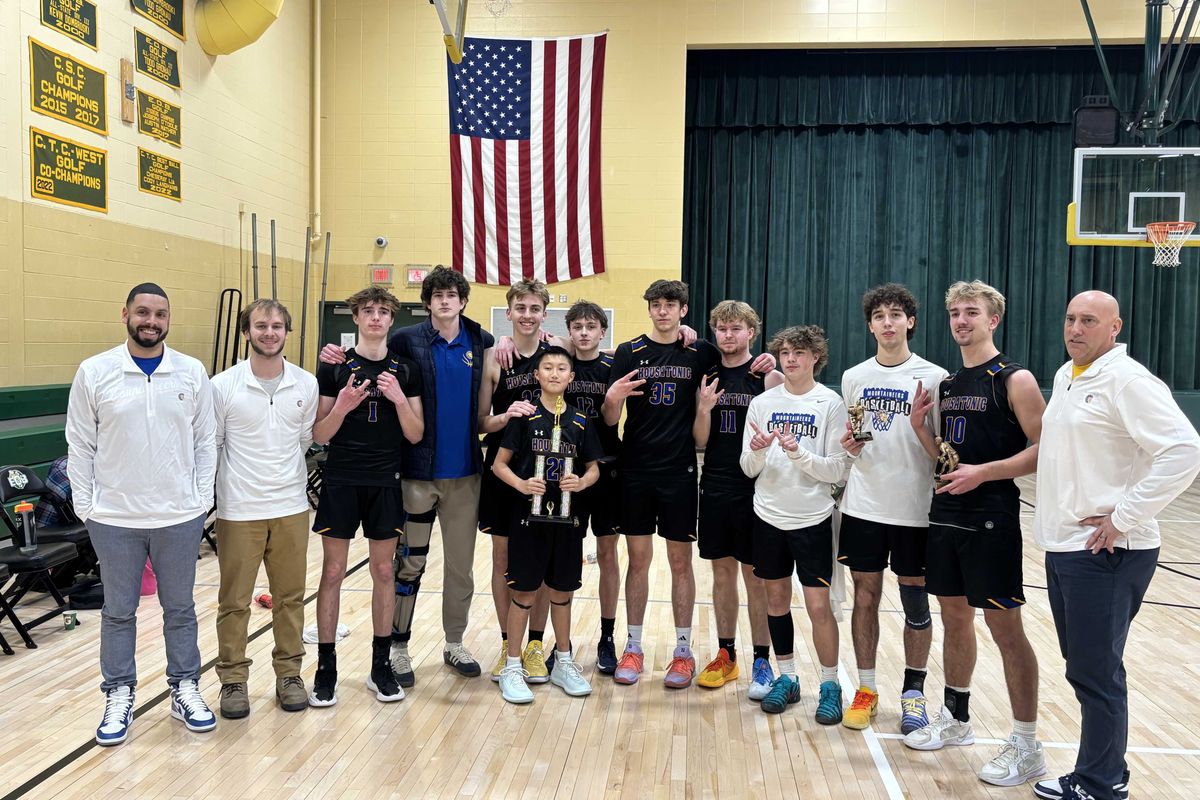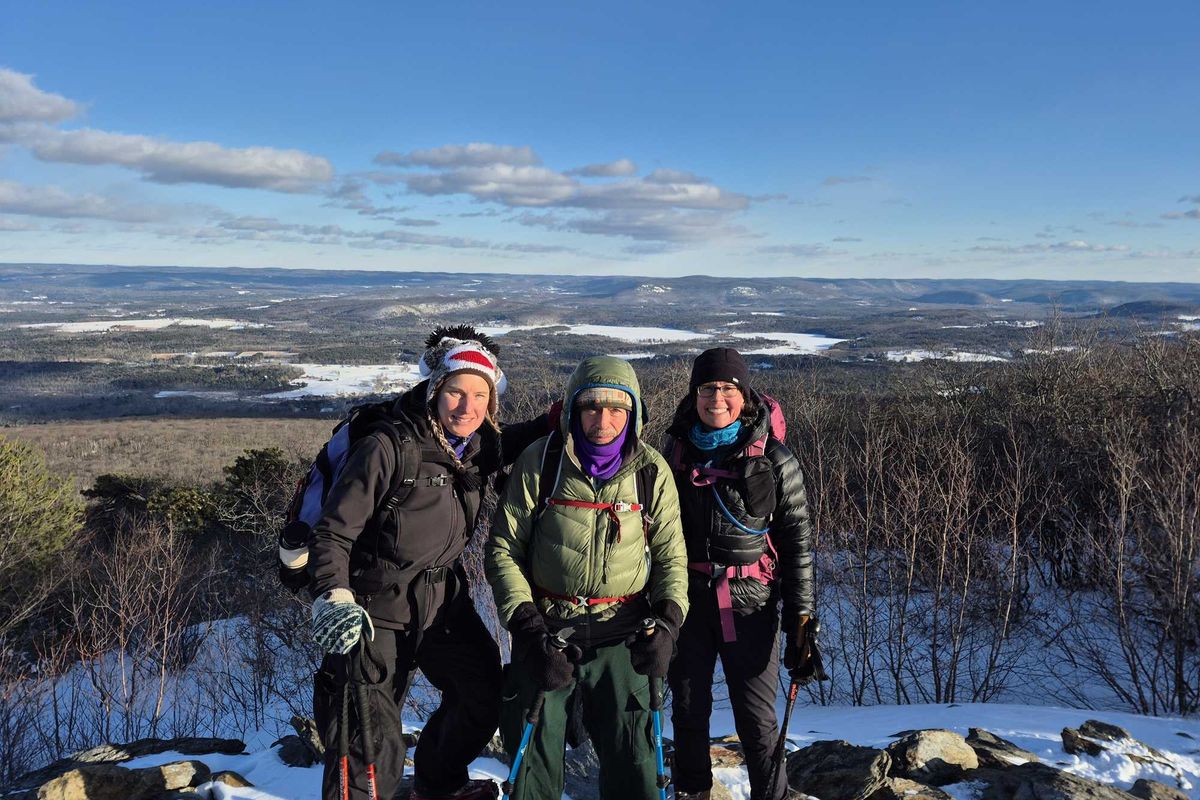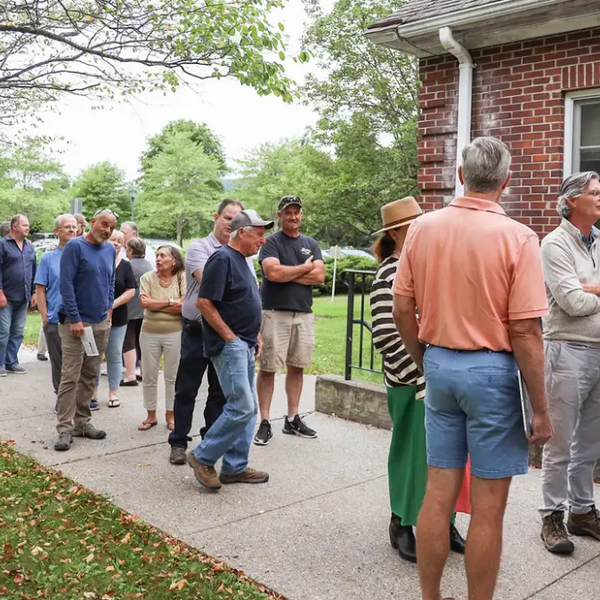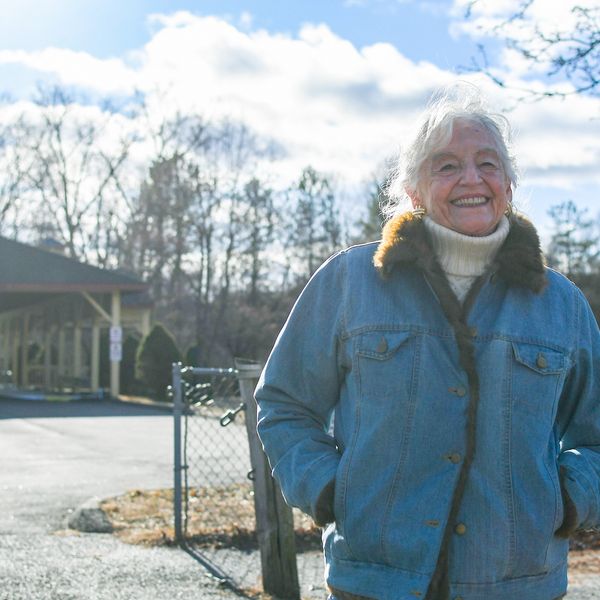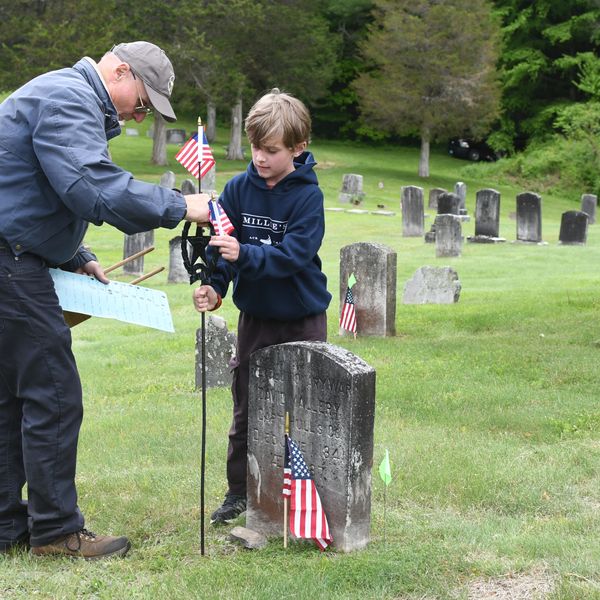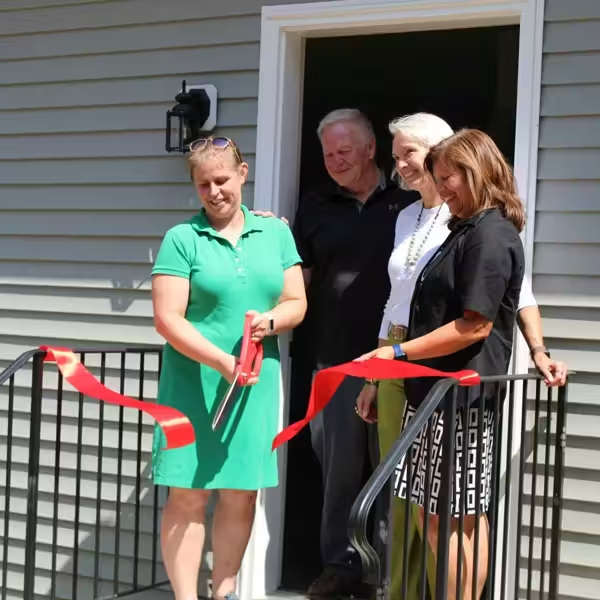Latest News
HVRHS wins Holiday Tournament
Jan 02, 2026
Housatonic Valley Regional High School's boys varsity basketball team won the Berkshire League/Connecticut Technical Conference Holiday Tournament for the second straight year. The Mountaineers defeated Emmett O'Brien Technical High School in the tournament final Dec. 30. Owen Riemer was named the most valuable player.
Salisbury’s Joel Blumert, center, is flanked by Linda Huebner, of Halifax, Vermont, left, and Trish Walter, of Collinsville, atop the summit of Bear Mountain on New Year’s Day. It was Blumert’s 1,000th climb of the state’s tallest peak. The Twin Lakes can be seen in the background.
Photo by Steve Barlow
SALISBURY — The celebration was brief, just long enough for a congratulatory hug and a handful of photos before the winter wind could blow them off the mountaintop.
Instead of champagne, Joel Blumert and his hiking companions feted Jan. 1 with Entenmann’s doughnuts. And it wasn’t the new year they were toasting, but Blumert’s 1,000th ascent of the state’s tallest peak.
The 76-year-old Salisbury resident has been hiking Bear Mountain twice a week, with only sporadic lapses, for nearly a dozen years. On New Year’s Day, Blumert reached the goal he set a few years ago of 1,000 climbs.
He has hiked it in the wintry cold and the summer heat, amid the splendor of the autumn foliage and even in the middle of a daunting tornado.
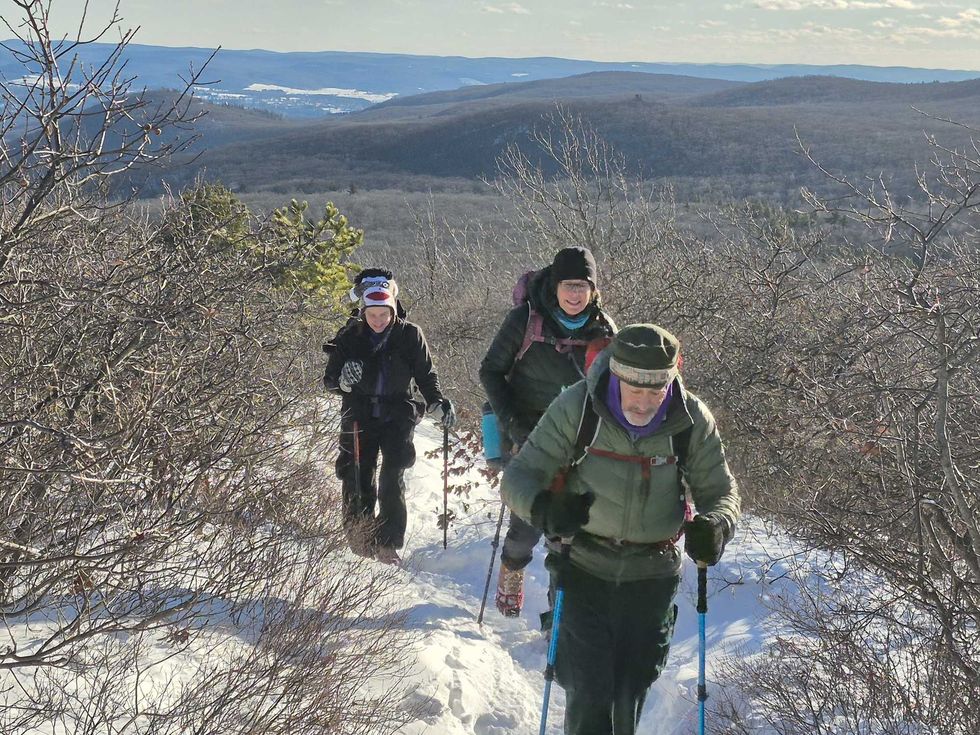
“It’s just been one step at a time and one climb at a time,” said Blumert, a musician who performs mostly at area nursing homes.
Blumert and his wife, Theresa Carroll, moved to Sharon in 1985 and to Salisbury in 1987, in part for the outdoor recreation the Tri-State region offers. But after their two daughters, Shayna and Denali, were born in the 1990s, Blumert’s exercise regimen started to lag.
In 2000, his doctor reported he had “ridiculously high blood pressure.”
“I decided if I was going to die of a stroke, it was better to die in the woods than sitting around the house,” Blumert said.
He began hiking again and rebuilt his endurance. In March 2014, he summited Bear Mountain, which at 2,316 feet is the highest peak in Connecticut. (The state’s highest point at 2,380 feet lies on the south slope of Mount Frissell at the border with Massachusetts.)
It was Blumert’s first hike up Bear in several years. As he gazed at the Twin Lakes shimmering below, he said to himself, “I love this mountain. I’m going to do this once a week.”
He grew to love the hike so much that after a year he doubled it to twice a week. Since then, Blumert has stuck to his weekly ritual with only occasional pauses for out-of-state trips or illness, along with one 13-week stretch when a pulled ligament in his pelvis planted him on the couch.
He knows the 2.9-mile route intimately, from the Undermountain trailhead off Route 41 to the intersection with the Appalachian Trail and on to the summit. In his sojourns, he has seen porcupines, deer, a timber rattler, a pair of copulating copperheads (“Or maybe they were milk snakes; I didn’t interrupt them to find out”), owls and redtail hawks — yet not a single bear.
Soon after he began hiking Bear regularly, Blumert made another vow: He would be cheerful and friendly to every hiker he met on the mountain. “I’ve developed trail friendships with 20 to 30 people,” he said.
One of them is Collinsville resident Trish Walter, who became a regular hiking buddy and has now climbed the mountain with Blumert about 70 times over the past five years.
Walter and her friend, Linda Huebner, of Halifax, Vermont, joined Blumert for his milestone hike on New Year’s Day. With 4 inches of snow having fallen the night before, they set foot shortly after noon and reached the top just before 3 p.m. The trek back down took half that time.
Aside from the blustery wind approaching the summit, they enjoyed a spectacular day of bright sunshine and blue skies.
The weather hasn’t always been so cooperative. Blumert was once nearly struck by lightning on the upper ridge. And this September, he hiked down in what he described as a tornado.
“It came right down Undermountain Trail,” he noted. “Trees were swishing back and forth. Branches were flying everywhere. There was grape-sized hail. It was scary.”
Now that he has reached his goal, Blumert plans to cut back to one hike of Bear each week. That will free time for other climbs in the area, a recumbent bicycle he has bought, and yet another mountaineering goal.
“I want to complete the 4,000-footers in New Hampshire,” Blumert said. “There are 48 of them, and I’ve done 23.”
Keep ReadingShow less
Tessa Dekker, four-year basketball player at Housatonic Valley Regional High School, was named female Athlete of the Year at the school's athletic award ceremony in May 2025.
Photo by Riley Klein
FALLS VILLAGE — From breakthrough victories to record-shattering feats, the past year brimmed with moments that Housatonic Valley Regional High School athletes will never forget.
From the onset of 2025, school sports were off to a good start. The boys basketball team entered the year riding high after winning the Berkshire League/Connecticut Technical Conference Holiday Tournament championship on Dec. 30, 2024.
Basketball games were well attended last winter thanks in part to the return of the Mountaineer cheerleaders. The squad performed halftime shows and coordinated themes for the audience, such as Hawaiian night.
“We made the themes really pop off,” said cheer captain Taylor Terwilliger.

The birth of a new Berkshire League rivalry emerged between HVRHS and the newly created Lakeview High School. The bleachers were packed when the girls and boys teams faced off back-to-back in Falls Village Feb. 5. HVRHS won the girls game 59-43, but Lakeview won the boys game 71-60.
At the end of the basketball season, Daniela Brennan was chosen to receive the Berkshire League’s Edward B. Kolakoski Sportsmanship Award.
The Housatonic co-op hockey team played its final game last winter. After the season, the co-op disbanded and this year HVRHS players are in a new co-op hosted by New Milford High School.

Players took to the diamonds come springtime for baseball and softball. In addition to high school teams, the Region One Middle School Mountaineers fielded teams for both sports.
Varsity baseball went on to earn a state tournament bid as the 21 seed. The boys played 12 seed Haddam-Killingworth High School in the first round and remained tied until a final inning walk-off win for HK.
Varsity girls lacrosse had a stellar season on the field and made it to the Western Connecticut Lacrosse Conference championship game. They ran into top-ranked Watertown High School and after a back-and-forth battle, Watertown won 6-4.

Track and field athletes made waves last season, breaking several school records and taking home 10 gold medals at the Berkshire League finals and festival. Sixteen Mountaineers represented HVRHS at the Class S state meet in New Britain and five went on to qualify for the State Open meet: Anthony Labbadia, Mia Dodge, Kyle McCarron, Gabi Titone and Ryan Segalla.
Labbadia’s performance in the triple jump earned him a spot at the New England track and field championships. His best distance of 44 feet and one inch stood for ninth place in New England and set the new HVRHS record. The previous school record of 43 feet eight inches was set by Don Hurlbutt in 1967.

Athletics continued into the summer with the Housy Hoops teams at the Torrington Summer Basketball League and the Housy Juniors in the Babe Ruth League summer baseball program. The girls basketball team became TSBL runners up after making it to the championship game against Lewis Mills.
When school started up in late August, fall sports swung into action beginning with varsity golf. Jonas Johnson went on to win the longest drive award at the Berkshire League golf all-star tournament Tuesday, Oct. 14.

Girls and boys soccer teams had historic seasons on the field and both qualified for the postseason tournaments.
The boys soccer team defeated Shepaug Valley High School for the first time in five years. The 1-0 win came in the Berkshire League tournament semifinals.
On the girls team, Ava Segalla set the new school scoring record with a total of 134 varsity goals. She surpassed the previous record of 120, which was set by her sister Sydney Segalla in 2021.
“Having scouts for the first time was definitely a very rewarding experience,” Segalla said. “It was exciting to see my hard work paying off.” Segalla committed to play Division I soccer at Sacred Heart University.
Girls soccer made a deep run in the Class S tournament, concluding with a showdown against Morgan High School in the semifinals. Morgan went on to become Class S champions.

HVRHS had three cross country runners medal at the BL championship Oct. 16. Olivia Brooks placed 11th, Hannah Johnson placed 17th and Finn Malone placed 18th.
Gilbert/Northwestern/Housatonic’s co-op football team was led in large part by the Mountaineers with eight seniors on the team. The team faced a top-heavy schedule and started the season 1-4. But they stayed disciplined and battled back to a 5-5 finish, concluding with a 34-0 shutout win in the Turkey Bowl.

“Out of the four years I’ve been playing, undefeated on Thanksgiving. No one will ever take that away from me,” said GNH captain Wes Allyn after the win.
Winter sports returned in December beginning with basketball. The girls team has a lot of young talent in new freshmen, and the boys team features a senior-heavy roster.
“I’m feeling very optimistic,” said senior captain Victoria Brooks. “Our strength is definitely going to be our dedication this year.”

Keep ReadingShow less
Sharon Hospital, shown here, experienced a consequential year marked by a merger agreement with Northwell Health, national recognition for patient care, and renewed concerns about emergency medical and ambulance coverage in the region.
Archive photo
Housing—both its scarcity and the push to diversify options—remained at the center of Sharon’s public discourse throughout the year.
The year began with the Sharon Housing Trust announcing the acquisition of a parcel in the Silver Lake Shores neighborhood to be developed as a new affordable homeownership opportunity. Later in January, in a separate initiative, the trust revealed it had secured a $1 million preliminary funding commitment from the state Department of Housing to advance plans for an affordable housing “campus” on Gay Street.
That commitment was later doubled by the state, allowing the trust to break ground in September on a project that will renovate the long-defunct Community Center—once a Masonic Temple—into four additional affordable units. Those apartments will join six already occupied units in adjacent buildings, creating a unified, 10-unit development. The project cleared its final local hurdle in November, receiving approvals from both the Zoning Commission and the Historic District Commission.
Alongside those efforts, a more contentious proposal dominated Planning and Zoning Commission agendas during the first half of the year. A condominium development proposed near Sharon Hospital drew support from residents who favor a more diverse housing mix, while neighbors raised concerns about potential impacts on property values and quality of life.
The project, proposed by Gold Dog LLC, a private development company, was approved in August following months of heated public hearings. That decision, however, has since been appealed by opponents, ensuring that housing will remain an ongoing issue.
Health
It was a consequential year for Sharon Hospital, marked by major institutional changes, national recognition, and lingering concerns about access to care.
In May, Nuvance Health, the nonprofit operator of Sharon Hospital, announced that it had formalized a merger agreement with Northwell Health, one of the largest healthcare systems in the Northeast. The announcement raised concerns among some residents who feared consolidation could lead to reduced services at a facility that serves a region often described as a healthcare desert.
Hospital President Christina McCullough sought to reassure the community, emphasizing that the merger was intended to strengthen—not diminish—local care. “It’s not about cutting resources and cutting services,” she said. “It’s about optimizing what both of those organizations have, ultimately strengthening the access to care for everyone that lives in the community.”
In July, Sharon Hospital was the only Connecticut facility included on a national list of rural hospitals considered vulnerable to potential Medicaid cuts, underscoring the financial pressures facing small hospitals nationwide.
Despite those challenges, the hospital earned national recognition the following month. In August, Sharon Hospital received a national award for excellence in stroke care. Later in the year, it was awarded its sixth consecutive “Five Star” rating from the Centers for Medicare and Medicaid Services, placing it among just 290 hospitals nationwide to receive the distinction.
The year ended on a more uncertain note, however, when the hospital announced it would discontinue its longtime emergency response provider, Northern Dutchess Paramedics, effective Jan. 1. The decision raised fresh concerns among residents about the future of ambulance coverage and emergency medical services in the region.
Nature
Sharon’s connection to its natural environment remained strong throughout 2025, with residents, conservation groups and state officials engaging in efforts to protect local ecosystems and wildlife.
In April, local conservationist and invasive species expert Tom Zetterstrom addressed a packed Town Hall, outlining strategies to protect Sharon’s woodlands from invasive oriental bittersweet. Drawing on both successes and setbacks at the Sharon Land Trust’s Hamlin Preserve, Zetterstrom highlighted the urgency of sustained management and community involvement.
That same month, concerned residents formed the Mudge Pond Association in response to a December 2024 study that warned of imminent threats to the pond from invasive species and polluted runoff. Since its formation, the group has begun piloting protective measures and planning long-term stewardship efforts for the popular lake.

Conservation efforts expanded later in the year when the Sharon Land Trust partnered with the Northeast Wilderness Trust to secure Sharon’s first “Forever Wild” protected land. Announced in late summer, the designation places roughly 700 acres surrounding Sharon Mountain under a permanent conservation easement, safeguarding critical wildlife habitat from development, logging and motorized use.
Wildlife coexistence also drew attention in December, when the state Department of Energy and Environmental Protection hosted a community roundtable on living alongside black bears. Residents emphasized a “human behavior”-focused approach, advocating for changes in food storage and waste management rather than lethal controls.
Throughout the year, the Sharon Audubon Center remained active with public programs and education initiatives, culminating in its annual December bird count. The event connected local volunteers to a nationwide community-science effort to track winter bird populations.
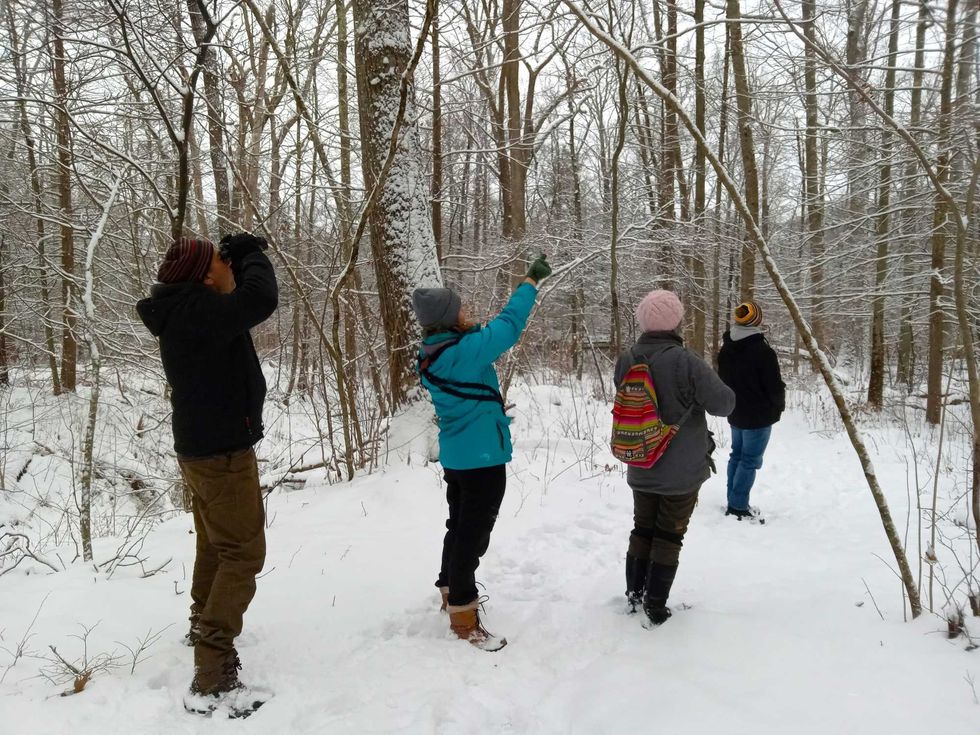
Holiday season
The year closed with holiday traditions that underscored Sharon’s sense of community, bringing warmth and light to the darkest days of winter. Annual tree and menorah lightings, held five days apart in mid-December, brought luminance, song and joy to the snow covered Village Green in scenes that were classically Sharon.
Keep ReadingShow less
loading
